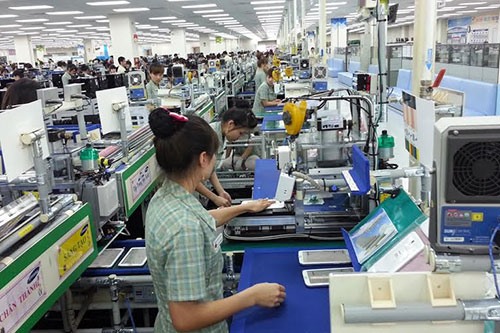Viet Nam is seen as a gateway for businesses from the Republic of Korea (RoK) to enter the ASEAN market, said experts at a forum in Ha Noi on December 3.

Viet Nam is seen as a gateway for businesses from the Republic of Korea (RoK) to enter the ASEAN market, said experts at a forum in Ha Noi on December 3.
The forum on the RoK’s New Southern Policy and the importance of RoK-Viet Nam relations was co-organised by the National Centre for Socio-economic Information and Forecasting (NCIF) and the Korean Institute for International Economic Policy (KIEP).
In his opening speech, NCIF Director Tran Hong Quang said over the past three decades, Viet Nam-RoK relations have seen fine developments in all fields. At present, the RoK is one of the two largest foreign investors in Viet Nam with accumulated capital of US$57.6 billion by the end of 2017. Viet Nam is also the fourth largest investment destination and the biggest aid recipient of the RoK.
The RoK is the second largest trade partner of Viet Nam, with two way trade increasing 117 times since 1992, when the two nations set up their diplomatic ties, hitting $61.5 billion last year.
The two countries have also seen positive collaboration in labour, culture and tourism.
By the end of 2017, the Vietnamese community in the RoK numbered 162,000, most of them are guest workers, those getting married to Koreans, and students. Meanwhile, around 150,000 Koreans, mostly businesspeople, are living in the Southeast Asian nation.
“Viet Nam always attaches importance to and wishes to deepen the strategic cooperative partnership with the RoK, which gives high priority to collaboration with ASEAN, including Viet Nam,” said Quang.
KIEP President Lee Jae-young said the New Southern Policy aims to raise the RoK’s cooperation and diplomatic relations with ASEAN countries and India on par with those with the US, China, Japan and Russia.
Notably, in its economic relations with ASEAN – a focus of the policy, Viet Nam plays a crucial role, accounting for more than half of cooperation in almost all fields such as trade, investment, official development assistance (ODA) and people-to-people exchange.
According to Prof Park Bun-soon from Korea University, there were many areas in which the RoK and Viet Nam could further co-operation, including developing high-tech industries, Viet Nam’s restructuring of State-owned enterprises, trade and investment.
“Korean investment would continue to flow into Viet Nam in the future,” he said.
The RoK’s investment played a key role in the co-operation between the two countries but linkage between foreign direct investment and the domestic sector remained relatively weak.
He said the capital flow from the RoK should be encouraged to develop Vietnamese small- and medium-sized enterprises and the part-supply industry. At the same time, Viet Nam should develop its capacity to absorb technologies by enhancing co-operation in research and development (R&D).
“Viet Nam also needs to provide opportunities for Korean investors to participate in mergers and acquisitions.”
Stressing the role of Viet Nam in ASEAN, Prof Park said that the RoK might seek a ‘Viet Nam +1’ strategy, adding that businesses from both sides could make joint efforts to enter neighbouring markets.
Tran Toan Thang from NCIF said that as part of the New Southern Policy it was important to link the RoK to ASEAN through Viet Nam.
Thang pointed out the large and increasing trade deficit with Korea and poor linkage between Viet Nam’s domestic firms and Korean firms remained issues to be addressed in boosting co-operation between the two countries.
Another problem was the low percentage of Vietnamese enterprises (only 33 per cent in the first six months of 2018) taking advantages of the Viet Nam-Korea free trade agreement (VKFTA) due to unawareness of Vietnamese firms and the unavailability of a proper certificate of origin system for Vietnamese firms.
“It is critical to strengthen linkages between Vietnamese and Korean firms and improve awareness of Vietnamese firms on rules of origin under the VKFTA,” Thang said.
In addition, focus should be placed on promoting the consumption of Vietnamese goods in the Korean market and establishing a network connecting businesses from both sides, he said.
At the conference, KIEP and NCIP signed a renewed memorandum of understanding. — VNS





